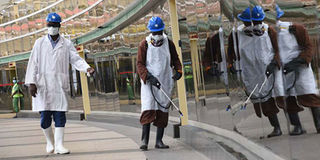World-class health service needed to tackle pandemic

Health Ministry staff fumigate JKIA against coronavirus, on March 24, 2020. PHOTO | EVANS HABIL | NATION MEDIA GROUP
What you need to know:
- Coronavirus is disrupting the established order, on a daily and massive scale, and ushering in new ways of life.
- President Kenyatta has so far done a commendable job of rallying Kenyans around the common cause of defeating coronavirus.
A pathogen, coronavirus, and the disease it causes, Covid-19, have hurled the world into a spin and are causing it to change faster than governments or citizens or both would have done.
That is what crises do. During crises leaders emerge from national to departmental levels. They think on their feet, take decisions swiftly and organise teams and structures to tackle the emergencies and save people, systems and countries. Who fits the bill in Kenya?
When there are crises such as Covid-19, governments must re-examine, reassess and evaluate their systems and structures to ensure they work and are fit for purpose.
Even more importantly, they should be primed to work swimmingly in a crisis in the future. Nairobi must get in tune and in tandem.
The initial reactions by governments, from Beijing shutting down the entire economy of Wuhan province, itself bigger than many European countries, to South Africa’s total lockdown, are meant to stop the patient bleeding, so to speak.
Coronavirus is disrupting the established order, on a daily and massive scale, and ushering in new ways of life.
That means when the coronavirus storm has ceased, there will be new words and deeds in Kenya and the leaders to enforce them in place or waiting in the wings.
NEW ORDER
It is the things that have brought Kenyans, and most people of the world, together that are suddenly under serious threat.
Places of worship and parlours of tipple, places of wet and dry markets, planes and trains, and sports and entertainment arenas, for example, have emptied.
Presidents, prime ministers, ministers, governors and assorted government spokespeople the world over are visible and voluble.
They are addressing their constituents daily, weekly, or ad hoc on progress being made by the government against Covid-19, the numbers of the afflicted and fatalities.
So Nairobi on Wednesday imposed a dusk-to-dawn curfew in peacetime. New Delhi forced a complete lockdown on its 1.3 billion people.
Kampala closed its borders and shut down public transport, and in Kigali President Paul Kagame features in a video clip showing the populace how to wash hands.
HEALTH WORKERS
But Covid-19 marches on. On Thursday, the number of deaths from the coronavirus in the UK hit 578, up by 119 in just 24 hours, from the previous total.
It was the highest figure so far for the UK, but all around the country, there is a consensus that there’s a tsunami coming.
At 8 o’clock (11pm Kenyan time), Brits, led by infected Prime Minister Boris Johnson, Chancellor of the Exchequer Rishi Sunak and infected heir-to-the-throne Prince Charles, applauded from balconies and doorsteps, health workers who lead the struggle against Covid-19.
Brits understand that their health workers, the men and women who make their beloved, but neglected and overwhelmed, National Health Service (NHS) work, deserve their undivided support and solidarity ahead of the imminent storm.
Kenya’s health workers have a long-standing raft of grouses, which GoK must address.
But the immediate thing to do, which the Brits have done, is to prepare for the expected outbreak.
ECONOMY BLEEDING
Wards have been discharged and converted into near or complete intensive units.
Teams of doctors and nurses have been trained and readied for the expected explosion of coronavirus.
Over in the United States, debate raged about whether the shutdown of the economy imposed in certain states to stem the march of coronavirus should be lifted by Easter.
That’s what President Trump wants to do, arguing that the cure must not be worse than the problem.
President Trump holds that the longer the economy stays shut, the more painful it is for Americans and the more difficult it will be to restart it once coronavirus is contained.
He makes sense, but more importantly he faces an election in November that could well turn on Covid-19.
Unlike Trump, Nairobi must not trade in the health of Kenyans for political profit. President Kenyatta has so far done a commendable job of rallying Kenyans around the common cause of defeating coronavirus. He must stay the course.
ADEQUATE RESOURCES
And he will do that by ensuring that Kenya has the equipment for testing for the coronavirus on a national scale and tracking the infected.
He will ensure health workers, who are on the frontline in the struggle against Covid-19, have the best personal protection equipment.
This will keep them safe so that they may make others safe. The Covid-19 crisis should teach Kenya how to create a world-class health service.





